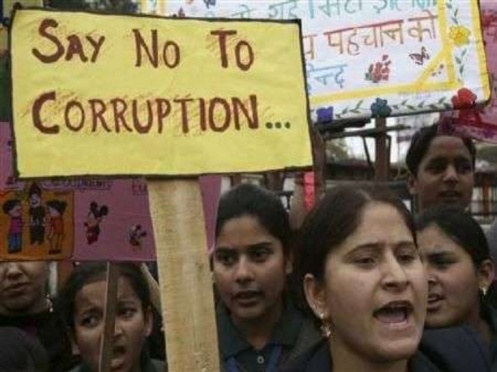 By Venkatesh Nayak*
By Venkatesh Nayak*9th December has been designated by the United Nations as International Anti-Corruption Day. Even though India ratified the UN Convention Against Corruption (UNCAC) in 2011, this year, International Anti-Corruption Day went by uncelebrated and in fact almost unnoticed. According to a UN estimate, every year, US$ 1 trillion is paid in bribes and US$ 2.6 trillion are stolen through corruption – a sum equivalent to more than 5% of the global GDP.
In 2015, Transparency International (TI) rated India 76thamong 168 countries surveyed for people’s perceptions about how corrupt they perceived their governments to be. Countries like Bhutan (27), Chile (23), Ghana (56), Jordan (45), Namibia (45), Panama (72), Rwanda (44), Saudi Arabia (48), Senegal (61), Seychelles (40), South Africa (61) and Uruguay (21) scored better than India on TI’s corruption perceptions index (CPI). In the BRICS grouping, India keeps company with Brazil at 76th place while China is at 83 and Russia far below at 119.
The National Crime Records Bureau (NCRB) publishes a wealth of statistics in its annual Crime in India Report (Chapter 9) about the action taken by the government in the States and the Union Territories (UTs) on complaints of corruption. Yet, these statistics dealing with the performance of the anti-corruption departments and courts in tackling corruption have received cursory attention in the media. These statistics are also published in the form of datasets on the Open Data Portal.
The Commonwealth Human Rights Initiative (CHRI) has analysed statistics relating to corruption cases reported from the stage of registration to the stage of conviction, as reported by the NCRB, since the beginning of the 21st century. Some preliminary findings are:
- As per NCRB data, between 2001-2015 a total of 54,139cases were registered across the 29 States and seven Union Territories (UTs). During this period, people filed more than double that number (1,16,010) of reports about being required to pay bribes, on the popular website – I Paid a Bribe;
- Between 2001-2015, the NCRB reported the registration of a little more than 5 lakh cases of murder(5,01,852 cases) across the 29 States and seven UTs. In comparison, only 54,139 cases of corruption were registered during the same period. In other words, for ten murders registered, only one case of corruption was registered across the country;
- During this 15-year period, the NCRB reported the registration of 87 lakh cases (5,87,347 cases) of kidnapping or abduction across the country. In other words, for 11 kidnappings or abductions registered across the country, only one case of corruption was registered by the law enforcement authorities;
- Between 2001-2015, the NCRB reported the registration of 3.54 lakh cases of robbery across the country (3,54,453 cases). In other words, for a little more than 6 robberies registered, only one case of corruption was registered by the law enforcement agencies;
- While 54,139 cases registered across the 29 States and seven UTs (irrespective of the outcome) trial was completed in 26% (29,920 cases). In other cases the accused were discharged or the FIR was quashed or the case was simply not put up for trial or the trial was still going on;
- Kerala clocked the highest conviction rate among States that registered a large number of cases as a proportion of cases sent up for trial at 95%;
- Despite several cases going up for trial no convictions have been reported from States such as West Bengal, Goa, Mizoram, Arunachal Pradesh, Tripuraand Meghalaya by the NCRB. In Manipur only one case is said to have reached conviction during this 15-year period;
- Between 2001 and 2015, trials involving 43,394 individuals were completed across the 28 States (excluding Himachal Pradesh and seven UTs. 68.19% (29,591) of the accused were acquitted by courts during this 15-year period (excluding Himachal Pradesh). In other words, only 31.81% (13,803) of the accused were found guilty by courts;
- In States like Goa, Manipur and Tripura the acquittals were 100%. All 30 accused were acquitted by courts in these States. In Andaman and Nicobar Islands the trial was completed in relation to one accused during this 15-year period resulting in acquittal;
- Nagaland is the only State that bucked this trend with convictions of more than 90% of the accused. In all, 438 accused were convicted. Of these, 404 were convicted in 2014. In Assam also, convictions were much high (70%), despite fewer cases going up to and completing trial;
- Almost 90%of the accused were acquitted in Jammu and Kashmir.
*Programme Coordinator, Access to Information Programme, Commonwealth Human Rights Initiative,New Delhi

Comments